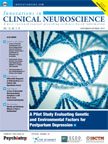Welcome to the September–October issue of Innovations in Clinical Neuroscience. We start with a study by El-Ibiary et al titled, “A Pilot Study Evaluating Genetic and Environmental Factors for Postpartum Depression,” in which the authors assess the influence of genetic and environmental risk factors on postpartum depression. The authors sought to expand the breadth and depth of potential postpartum depression risk factors to include genetic, biological, and psychosocial determinants and potentially illuminate and inspire future areas of research. Pilot data suggest DNA variations in HTR2A may be associated with postpartum depression. Psychosocial variables were also identified as risk factors.
Next, Ounes et al present a case report titled, “Differential Diagnosis of Hallucinations in a Patient with Myasthenia Gravis,” which describes a 63-year-old woman who presented with comorbidity of myasthenia gravis and psychosis. After revealing a protracted history of physical spousal abuse, along with patient symptoms and results of different investigations, the authors concluded the patient had a form of posttraumatic stress disorder with secondary psychotic features.
Following this, Lui et al present a case report titled, “A Case of Reversible Neuropsychiatric Symptoms in HIV due to Toxic Leukoencephalopathy,” which describes a 37-year-old, HIV-positive woman who experienced a neuropsychiatric syndrome consistent with paradichlorobenzene-induced toxic leukoencephalopathy after two decades of mothball abuse.
Finally, in this month’s installment of The Interface, Sansone and Sansone examine the relationship between obesity and alcohol/drug misuse. Overall, the authors found that the literature does not clearly support the contention that obese individuals are at a higher risk for substance misuse, although specific sub-populations of the obese may be (e.g., those with Cluster B personality disorders). The authors note that some authorities contend that food and drugs compete for the same reward pathways in the brain, suggesting that obesity may actually be protective against substance misuse.
Sincerely,
Amir Kalali, MD
Editor, Innovations in Clinical Neuroscience






